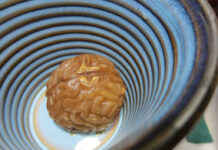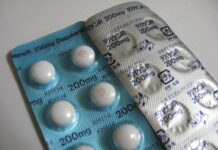Antidepressant-Induced Mania
It is generally recognized in antipsychiatry circles that antidepressant drugs induce manic or hypomanic episodes in some of the individuals who take them. Psychiatry's usual response to this is to assert that the individual must have had an underlying latent bipolar disorder that has "emerged" in response to the improvement in mood. The problem with such a notion is that it is fundamentally unverifiable.
The Good, the Bad, and the Ugly: An Infographic on Bipolar Drugs
Bipolar drug therapy is a balancing act of benefits vs. harms. Odds of attributable benefit cluster in a 15-25% band, so 75%-85% don’t see substantial benefit. Stated differently, if five people take a bipolar drug, only one is likely to see substantial improvement due to it, but all five will have side effects.
Gradual Tapering is Most Successful for Withdrawal from Antipsychotics
Mixed-Methods study explores the experiences of antipsychotic discontinuation among service users.
Study Suggests Mania More Common in Psychosis When Antidepressants Used
A prospective cohort study of those labeled high risk for psychosis finds a higher prevalence of antidepressant use among those who develop manic symptoms.
40,000 Suicides Annually and America Still Shrugs
In my last two posts, Back in the Dark House Again: The Recurrent Nature of Clinical Depression and Am I Having a Breakdown or Breakthrough? Further Reflections on a Depressive Relapse, I have shared my recent relapse into depression. Although it has been tough, when I wake up each morning I am grateful for one thing — I am not suicidal. Others are not as fortunate.
Brain Scans Cannot Differentiate Between Mental Health Conditions
A new study analyzing over 21,000 participants found that differences in activation of brain regions in different psychological “disorders” may have been overestimated, and confirms that there is still no brain scan capable of diagnosing a mental health concern.
Sinead O’Connor Announces: “I’m Not Bipolar . . . I Should Never Have Been...
Singer Sinead O'Connor announced on her website that after several "second opinions" she has learned "I do not in fact suffer from Bi Polar...
How the Human Stress Response Explains Away “Bipolar Disorder”
Here we'll take a look at so-called 'mania.' We'll go through the criteria for a 'manic episode' symptom by symptom so you can see how the stress response is potentially operating. There's practically nothing that happens in human minds and bodies that the stress response doesn't potentially affect.
United Nations Report Calls for Revolution in Mental Health Care
In a new report, the United Nations Special Rapporteur on the right to health, Dr. Dainius Pūras, calls for a move away from the biomedical model and “excessive use of psychotropic medicines.”
Do 5 Million Americans Really Have Bipolar Disorder?
5.7 million Americans say they have "Bipolar Disorder." These patients have been labeled, categorized, and offered an understanding of themselves as diseased, sick, and permanently broken. It is considered one of the more severe "mental illnesses," perhaps because it presents almost as an amalgamation of psychosis and depression in a particularly volatile form. In my training, I was taught to medicate these patients, often with multiple medications, and often against their will. Poetically, though, these patients — desperate to understand who they are in a system that condemns them to a life of struggle and suffering — will be vindicated by modern science.
Duty to Warn – 14 Lies That Our Psychiatry Professors in Medical School Taught...
Revealing the false information provided about psychiatry should cause any thinking person, patient, thought-leader or politician to wonder: “how many otherwise normal or potentially curable people over the last half century of psych drug propaganda have actually been mis-labeled as mentally ill (and then mis-treated) and sent down the convoluted path of therapeutic misadventures – heading toward oblivion?”
Well-Being Therapy: A Guide to Long-term Recovery
If a patient has high cholesterol or sugar, the doctor may prescribe a drug to lower what is too high, but he/she generally adds some suggestions: for instance to avoid certain types of food, to do more physical activity, to refrain from smoking. But if someone has a low mood and sees medical help, the doctor--particularly if he or she is a psychiatrist--will likely just prescribe a drug and not encourage any “self-therapy.” The problem with his approach to care is that psychiatric drugs, even when they are properly prescribed, may help very little in the long run and create a number of additional problems
Anticonvulsant Implicated in Birth Defects in up to 4,100 Children, French Study Finds
Between 2,150 and 4,100 children suffered from severe malformations connected to valproate prescription.
The Genetics of Schizophrenia: A Left Brain Theory about a Right Brain Deficit in...
In recent months, two teams of researchers in the UK and the US published complementary findings about the epigenetic origins of schizophrenia that have scientific communities who indulge in ‘genetic conspiracy theories’ abuzz. While these results are intriguing, and no doubt involve pathbreaking research methodologies, this line of thought represents a decontextualized understanding both of the symptoms that are typically associated with schizophrenia, and their causes.
Disease Theory of ‘Mental Illness’ Tied To Pessimism About Recovery
Researchers recently completed a first of its kind, large-scale international survey of attitudes about mental health and they were surprised by the results. According to their analysis published in this month’s issue of the Journal of Affective Disorders, people in developed countries, like the United States, are more likely to assume that ‘mental illnesses’ are similar to physical illnesses and biological or genetic in origin, but they are also much less likely to think that individuals can overcome these challenges and recover
People Diagnosed with Bipolar Disorder at Increased Risk for Parkinson’s
Increased Parkinson's risk could be related to lithium, antipsychotic, and antiepileptic drug use.
Study Explores Meanings of Bipolar Disorder to Those Diagnosed
The narratives about Bipolar Disorder promoted by drug companies may influence how those diagnosed understand themselves.
Childhood Trauma Linked to Bipolar Diagnosis, Symptoms
Research on a sample of 587 patients with DSM-IV defined bipolar disorder finds that an earlier age at onset of bipolar illness - along...
To Live and (Almost) Die in L.A.: A Survivor’s Tale
After 25 years of chronic emergency, 22 mental hospitalizations, a stint at a “community mental health center,” 13 years in a "board & care," repeated withdrawals from addictions to legal drugs, and a 12-year marriage, I plan to live every last breath out as a survivor, an advocate, and an artist.
Reappropriating Bipolar Beyond Pathology
It’s still not easy for me to say, “I’m bipolar.” Know that I’m bipolar for good reason, reappropriating a painful word, so those in pain can find me—so you can find me. This is how I reappropriate a term used to strip me of my humanity, a term used to sell me counterfeit versions of reality. I refuse to let go of a label that helps me find my people, no matter how painful it is to retain.
Pilot Study Adapts Open Dialogue for US Health Care
In an article for Psychiatric Services, psychiatrist Christopher Gordon and his colleagues report on the results of a one-year feasibility study attempting to implement...
Bright Light Therapy More Effective Than Medication Alone for Bipolar Depression
A new randomized, double-blind, placebo-controlled trial has found bright light therapy to be a powerful intervention that could provide an alternative to medication for people with “bipolar depression.”
Disability and Mood Disorders in the Age of Prozac
When I was researching Anatomy of an Epidemic and sought to track the number of people receiving a disability payment between 1987 and 2007 due to “mental illness,” I was frustrated by the lack of diagnostic clarity in the data. The Social Security Administration would list, in its annual reports on the Supplemental Security Income and Social Security Disability Insurance (SSDI) programs, the number of people receiving payment for “mental disorders,” which in turn was broken down into just two subcategories: “retardation,” and “other mental disorders.” Unfortunately, the “other mental disorders,” which was the category for those with psychiatric disorders, was not broken down into its diagnostic parts.
NICE Guidelines for Bipolar Disorder- a Missed Opportunity
There are some things to applaud about the recently released update of the NICE bipolar guidelines, not least the recognition that the diagnosis has been inappropriately applied to children with behavioural problems. Hopefully this will help curtail the worrying trend of using toxic bipolar drugs in this age group. As usual, however, the Guidelines overlook glaring problems with the evidence base for drug treatment in general, and miss an opportunity to stem the diagnostic creep that has come to the UK and Europe via the United States.
Lithium: A Survivor’s Guide for Parents
When I was a young adult, I was misdiagnosed with bipolar disorder and placed on lithium. I am 61 years old now, living on the edge of end-stage kidney disease. If I could undo everything, by all means, I would not have taken this drug. It is not safe for anyone at any age.






















